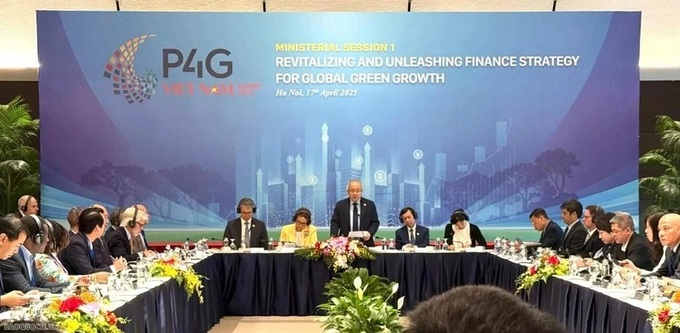
At the discussion on "Revitalising and Unleasing Finance Strategy for Global Green Growth". (Photo: VNA)
Ministerial discussions were held on April 17 within the framework of the 4th Partnership for Green Growth and the Global Goals 2030 (P4G) Summit, bringing together domestic and international officials to address critical aspects of sustainable development and green transition.
A call to action
Vietnamese Minister of Agriculture and Environment Do Duc Duy, who chaired the session “Riding with the Green Revolution 4.0: The Journey of Transforming the Food System for a Sustainable Era”, emphasised that the revolution is not only an option but also an essential requirement and imperative for action amidst unprecedented challenges such as severe climate change, rapidly declining biodiversity, disrupted global food supply chains due to geopolitical instability, rising protectionism, threats to food security, and widening development gaps between nations.
According to Duy, the Green Revolution 4.0 carries the expectation of comprehensively transforming food systems through the application of digital technology, AI, big data, biotechnology, and innovative solutions. The revolution helps increase productivity and product quality while contributing to reducing resource consumption, cutting emissions and enhancing resilience to climate change, thereby creating the foundation for improving farmers' livelihoods and enhancing consumer welfare.
Regarding Vietnam's food security situation aligned with the green agricultural transformation process, the minister noted that from a country that once faced poverty and food crises, Vietnam has now emerged as one of the world's leading agricultural product exporters, with products present in nearly 200 countries and territories. However, with limited resources, an estimated 10.3 million hectares of land available for farming, Vietnam's agricultural sector is facing formidable challenges.
To address these challenges, the ministry is gradually implementing agricultural transformation towards green, smart, and sustainable practices, identifying innovation and substantive focus on research, application of modern technologies, and digital transformation as core elements to create breakthrough for the sector, he said.
An opportunity to shape a sustainable development future
Chairing the discussion on “Innovative Solutions for the Effective and Sustainable Energy Transition”, Vietnamese Deputy Minister of Industry and Trade Nguyen Hoang Long underscored the need for energy transition amidst challenges and impacts from climate change, environmental degradation, and depletion of natural resources.
To realise its net-zero commitment made at the 26th UN Climate Change Conference in Glasgow (COP26), Vietnam has carried out various solutions, Long said, laying stress on the three orientations in the country’s sustainable energy transition, namely innovation, public-private partnership models and international cooperation, and people-centred approach.
He affirmed that innovation promoting green and sustainable energy transition is not only a goal but also an opportunity for countries, including Vietnam, to shape up a sustainable development future. He also expressed his confidence that Vietnam and other P4G member countries, along with many partners worldwide, can create a world where clean energy is not just a goal but a universal right, bringing sustainability and happiness to future generations.
At the event, domestic and international delegates exchanged views on innovative solutions and application of new technologies to increase efficiency and sustainability in energy development and use.
Developing green financial market
At the discussion themed “Revitalising and Unleasing Finance Strategy for Global Green Growth”, Vietnamese Deputy Minister of Finance Do Thanh Trung held that Vietnam has jumped to the green transition bandwagon – an irreversible global trend, showing its determination in green growth orientation by engaging and implementing multiple international commitments on sustainable development and climate change.
One of the most outstanding results in Vietnam's green growth orientation is in the field of green finance and green credit, he said, elaborating green credit debt has increased from 71 trillion VND (nearly 2.9 billion USD) in 2015 to 564 trillion VND in 2023, accounting for 4.4% of the economy’s total outstanding debt.
For global commitments to achieve positive and substantial results, he suggested that countries need to consult on policies and coordinate actions more closely to develop and implement financial mobilisation strategies for green growth in accordance with the structure of the global financial system. In this process, repositioning the mission and role of national financial institutions in the global structure should be identified as a priority breakthrough solution.
At the discussion, delegates focused on topics including experiences in developing green financial markets, solutions to overcome technical, legal, and market barriers, and financial policies to attract investment from both public and private sectors.
Secretary-General of the UN Trade and Development (UNCTAD) Rebeca Grynspan said that although green capital flows are directed towards different sectors and fields, some climate-affected areas have not accessed the capital or still face difficulties in financial funding. She said P4G represents a historic opportunity to encourage global banks to provide financial capital and increase investment for the private sector./.
